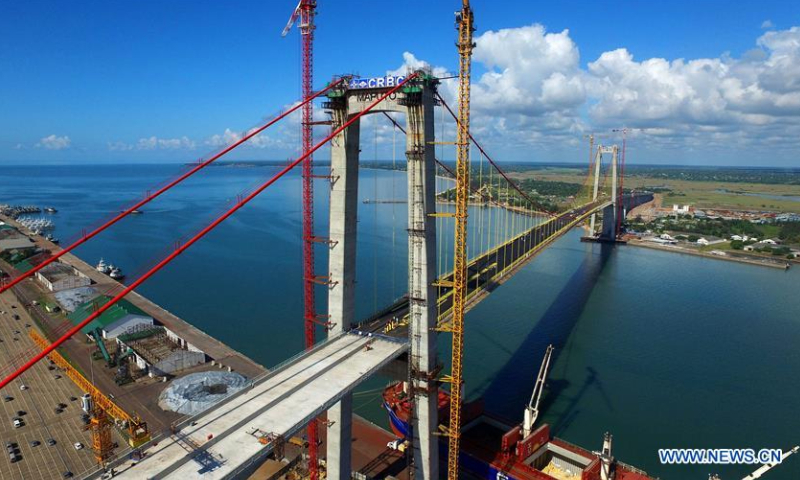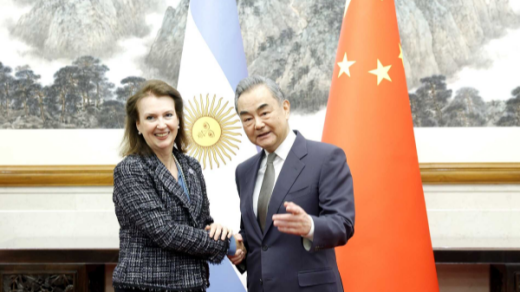
Aerial photo taken on May 8, 2018 shows the Chinese-built Maputo Cross-sea Bridge in Maputo, Mozambique. Photo: Xinhua
The rise of the Global South is being boosted as developing countries, African countries in particular, awaken to a sense of autonomy. They are actively putting forward their own proposals and solutions for global governance.
The recent Africa Pulse report by the World Bank projected that economic activity is set to rebound in Sub-Saharan Africa. However, the recovery remains fragile. Africa still needs to overcome significant challenges.
Compared with last year, the inflation rate of most African economies has decreased, averaging from 7.1 to 5.1 percent, but it is still higher than the level before the outbreak of the COVID-19 pandemic. In the global context of post-COVID recovery, Africa is facing three main challenges. If these problems can be solved, Africa will secure better development.
First, regional conflict and unrest are major obstacles to economic recovery in Africa. The World Bank report warned that increased conflict and violence in the region will continue to weigh on economic activity. The regional political unrest has led to the spread of extremism and violence. Foreign investment in Africa is increasingly taking into account the local security situation, leading to a lack of momentum in the economic recovery and growth in Africa.
Second, major-power rivalry is a factor that disrupts the development process for Africa. The African continent is home to many underdeveloped countries and is a key region for the United Nations’ “2030 Agenda for Sustainable Development.” However, in a multipolar world, countries like the US and Japan are engaging in competition with emerging market countries, making it difficult for African countries to avoid the dilemma of “taking sides.” As a result, Africa’s development process is being hindered by major-power rivalry.
The US has repeatedly threatened to cut off aid to African countries for engaging in trade with Russia. The rise in youth unemployment in Africa has fueled discontent with pro-Western governments on the continent. The shadow of a “new cold war” has loomed over the African continent, making the development agenda difficult to advance.
By 2023, progress had been made in over half of African countries toward climate action goals and responsible consumption and production goals. However, the other 15 of the 17 UN sustainable development goals are facing various challenges, with 10 of them not being achieved in any African country. African countries are also facing challenges in achieving the zero hunger goal.
Third, the burden of debt is a chronic problem that restricts economic growth in Africa. After the 2008 international financial crisis, and the decline in prices of international commodities such as oil, metals, and agricultural products, the debt risks faced by African countries increased again. The impact of the COVID-19 pandemic has exacerbated the problem. At the same time, the increase in debt obligations has directly caused liquidity problems, squeezing out development expenditure, and making it more difficult and costly to obtain external financing.
In recent years, South-South cooperation has injected momentum into development. With Ethiopia officially becoming a member of the BRICS mechanism, the collective cohesion of developing countries has been further strengthened, enabling them to address their development challenges through regularized mechanism cooperation and targeted solutions.
The African Continental Free Trade Area is moving in the right direction, with African countries collectively promoting liberalization and integration of trade within the region. The Belt and Road Initiative is helping to drive shared development benefits for many African countries, providing more development funds and diverse options for Africa’s recovery and development. It is believed that African countries will be able to explore their own development models and paths through South-South cooperation, making greater contributions to global economic growth.
It is estimated that by 2050, the population of Africa will account for nearly a quarter of the world’s population, making the development prospects of Africa crucial for the stability and sustainable development of the global economy. However, the current growth of the African economy is still slow and insufficient to provide a significant contribution to poverty reduction. The international community should pay more attention to development issues in Africa with a rational and objective attitude, and make continuous efforts for the lasting peace and common development of human society.
The author is a professor with School of International Relations and Diplomacy, Beijing Foreign Studies University. [email protected]



